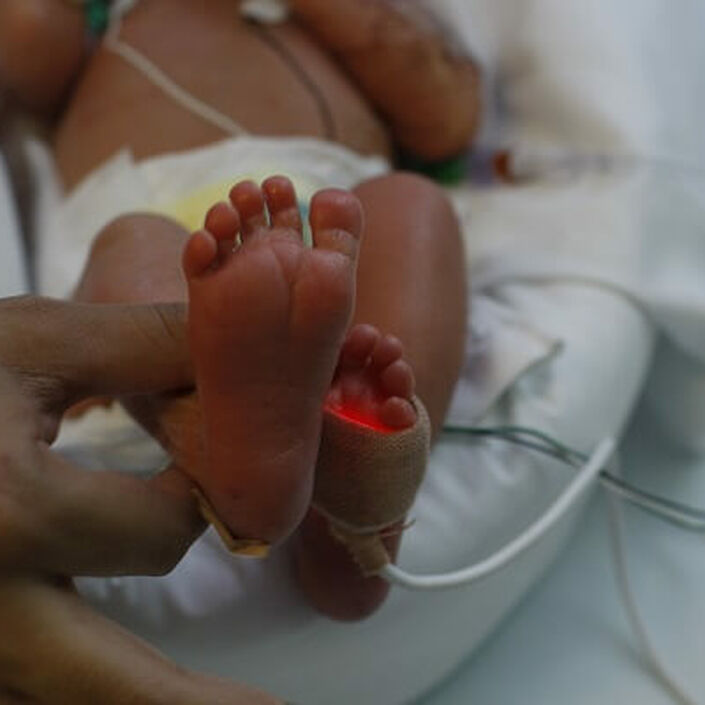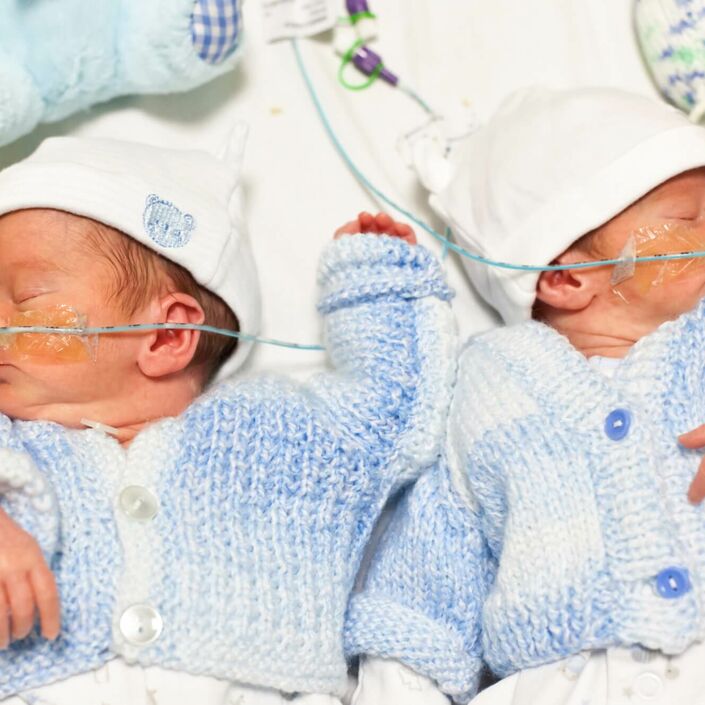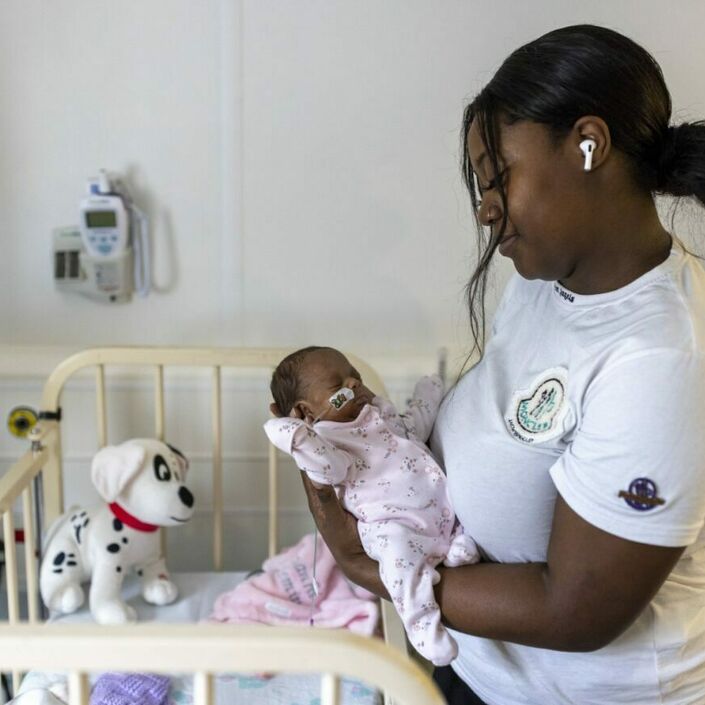Bliss is an integral member of the research teams for the following projects, currently supporting £8.1 million of research in neonatal care.
Current research projects
COLLABORATE
The COLLABORATE study will help answer important questions about the best way to support the growth and development of extremely premature babies. If there isn’t enough breastmilk to feed a premature or sick baby, milk will need to be supplemented with either pasteurised human donor milk or a special preterm formula. Medical teams do not yet know which is better as a supplement.
Pasteurised human donor milk: Pasteurised donor milk is safe because heat treatment removes the risk of infection. However, this process also reduces effectiveness of breastmilk that help fight infection and support growth and brain development.
Fortifier: The nutritional content of human milk may not be enough for extremely preterm babies. Because of this, extra nutrients, called fortifiers, can be added. These are made from cow’s milk. Some healthcare professionals think adding fortifiers helps babies grow, others worry it could result in overfeeding.
Preterm formula: Preterm formula contains consistent levels of nutrients and is carefully regulated. However, some healthcare professionals worry formula, and fortifier, might increase the risk of a rare condition called necrotising enterocolitis.
COLLABORATE will resolve the uncertainties around the use of pasteurised human donor milk, preterm formula, and fortifier for extremely preterm babies. The goal of COLLABORATE is to find out which approach works best for babies. The study is about resolving uncertainties that cause anxiety for parents and confusion for clinical teams, to find answers to what type of feeding helps gives extremely preterm babies the best start in life.
See this COLLABORATE explainer video for more details.
Websites: X (formerly Twitter), YouTube, LinkedIn, Mastodon , Bluesky
DOLFIN
Babies who are born very prematurely, or who suffer poor blood supply or lack of oxygen to the brain before or around the time of birth, are more likely to experience problems with their brain development. This may impact the ability of children to think, learn, communicate, play and interact with their surroundings.
The developing brain is constantly making new connections and nerve cells from specific nutrients and babies may need higher amounts of these nutrients to support brain growth and development.
The DOLFIN trial is investigating whether adding a daily nutrient supplement to the milk or food of babies born prematurely or who suffer poor blood supply or lack of oxygen to the brain around birth can help improve child neurological development.
The trial population will be made up of babies born less than 28 weeks of gestation (preterm group) and babies born at 35 weeks of gestation or more, receiving therapeutic hypothermia for hypoxic-ischaemic encephalopathy (HIE group).
The trial aims to recruit 1,010 babies from around 30 neonatal units across the UK.
Lead Applicants: Professor Jeremy Parr, Newcastle University. The project is managed by the National Perinatal Epidemiology Unit, Clinical Trials Unit (NPEU CTU) at the University of Oxford and sponsored by The Newcastle upon Tyne Hospitals NHS Foundation Trust.
Funding: NIHR Health Technology Assessment (HTA) Programme, approximately £3,700,000 funding.
Website: https://www.npeu.ox.ac.uk/dolfin
FEED1
A large number of infants admitted to neonatal units are those born prematurely at 30-33 weeks.
Babies who are born early are currently fed small amounts of milk, ‘gradually’ through a tube into their stomach, with additional nutrition through a drip into their veins. Babies are fed this way because of concerns about Necrotising Enterocolitis (NEC).
However, research suggests that for premature babies who aren’t too poorly, larger milk feeds can be given without increasing the risk of NEC and might also reduce the risk of severe infection.
The FEED1 trial compares whether starting babies (born at 30-33 weeks gestation) on “full milk feeds” rather than “gradual milk feeds” will lead to babies going home from hospital earlier and will affect their later development.
Lead Applicant: Dr Shalini Ojha, University of Nottingham.
The University Hospitals of Derby and Burton NHS Foundation Trust are the sponsor of this study. The study is coordinated by the Nottingham Clinical Trials Unit.
Funding: National Institute for Health Research (NIHR) Health Technology Assessment Programme, approximately £2,000,000 funding.
Website: https://www.feed1.ac.uk/home.aspx
Recruitment end date: September 2024.
CASSAVA
It is not currently known whether a vaginal delivery or a caesarean section is safer for women and their babies with an early birth, or whether both are equally safe.
The CASSAVA study aims to seek the best way to manage the birth of women presenting in preterm labour. The first part of this research is to find out where doctors and women feel that more research on this topic is needed.
Lead Applicant: Professor Jane Norman, The Queen’s Medical Research Institute, University of Edinburgh
Funding: NIHR Health Technology Assessment Programme, £309,105.
SurfON
Many late preterm and early term babies have breathing problems after birth, which can be severe. The lungs of healthy full term babies produce surfactant, a substance that makes it easier for them to breathe.
Late preterm or early term babies often do not make enough, or their natural surfactant does not work properly. We can give extra surfactant into the lungs of these babies by putting a tube in the windpipe. However, not all babies need extra surfactant, but it is hard to predict which do and which do not.
SurfON (Surfactant Or Not) aims to investigate whether, in late preterm and early term infants with respiratory distress, giving surfactant early can reduce the number of days that babies with breathing problems need to stay in hospital.
Lead Applicant: Professor Elaine Boyle, Department of Health Sciences, University of Leicester
Funding: NIHR Health Technology Assessment Programme, £1,671,376.
OPTI-PREM
Babies born between 27 and 31 weeks of pregnancy in England and Wales are currently looked after in two different types of settings: Neonatal Intensive Care Units (NICU) and less intensive local neonatal units (LNU).
Both types of unit can provide the care these babies are likely to need, but LNUs tend not to look after the very smallest babies and so are designed and staffed differently. Read more about the different levels of neonatal care.
Optimising Neonatal Service Provision for babies born between 27 and 31 weeks (OPTI-PREM), is a project which aims to look at which type of unit leads to the best outcome for babies at each week of gestation in this range, is most cost effective for families and the NHS, and is the best at taking into consideration the views and needs of parents and families when their baby is being cared for far from home, or being transferred between units. Read more about the OPTI-PREM project.
Lead Applicant: Dr Thillagavathie Pillay, University Hospitals Leicester NHS Trust, and University of Wolverhampton.
Funding: NIHR Health Services and Delivery Research Stream, £924,469.
CuBS
Currently, premature babies are transitioned from tube feeding to oral feeding by a scheduled feeding programme, at set times in the day. This differs from healthy full-term babies who are fed when they show signs of hunger (cue-based feeding).
This study, CUe-Based versus Scheduled feeding (CuBS), aims to help parents and staff in neonatal units to feed premature babies in neonatal units using cue-based feeding instead of scheduled feeding. The plan will include training for staff and educational materials for parents.
Find out more about different ways to feed your premature baby.
Lead Applicant: Dr Alison McFadden, University of Dundee
Funding: NIHR Health Technology Assessment Programme, £343,759.
ToSCiN
Premature babies who undergo surgery due to problems with their bowel often require stomas to be formed temporarily. Forming these stomas can be a life-saving procedure however these stomas need to be closed later on to allow the infant to remain healthy and grow.
The best timing to close a stoma is not currently known and practice varies between centres. The ToSCiN study (Timing of Stoma Closure in Neonates) is looking at whether a trial could help solve this issue and find the best timing for a stoma closure.
Lead applicant: Dr Nick Lansdale, Royal Manchester Children's Hospital
Funding: NIHR Health Technology Assessment Programme, £395,406.
Neonatal Cochrane
Cochrane Reviews are systematic reviews in healthcare research and policy. The Cochrane partnership programme aims to support the development, production, and use of these reviews to inform neonatal care.
This project aims to develop reviews that support key research priorities in neonatal care, for example, preventing and treating infections in babies in neonatal care.
Lead Applicant: Professor William McGuire, University of York
Funding: NIHR Systematic Reviews Programme, £397,034.
Completed research projects
NeoEPOCH
Neonatal Electronic health record data for Point Of Care Health research and continuous incremental improvement in neonatal care (NeoEPOCH) is a collaborative group of neonatal doctors, nurses, researchers and parents whose overall aim is to improve neonatal care through the use of electronic health record data.
Three projects undertaken by this group were supported by Bliss: WHEAT, COIN and BUDs.
Lead Applicant: Dr Chris Gale, Chelsea and Westminster Hospital, Imperial College London
Funding: Medical Research Council Clinical Scientist Fellowship, £1,019,913.
WHEAT
Currently, 1 in 3 neonatal units in the UK stop feeding babies during a blood transfusion to try and reduce the risk of developing necrotising enterocolitis (NEC). However, we do not know how helpful this is.
The WHEAT pilot study (WithHolding Enteral feeds Around packed red cell Transfusion), aimed to determine whether stopping the feeding of a baby during blood transfusion reduces the risk of developing NEC.
Lead Applicant: Dr Chris Gale, Chelsea and Westminster Hospital, Imperial College London
Funding: NIHR Health Technology Assessment Programme, £990,000.
COIN
Core Outcomes In Neonatology (COIN) aimed to identify what outcomes of neonatal care are most important to: parents of babies needing neonatal care, neonatal patients, researchers, and clinicians.
This project identified a core set of outcomes that should be collected during all neonatal research, ensuring that future research involving neonatal babies will collect outcomes that are important to all groups involved. Read the results of the COIN study, published in the BMJ.
Lead Applicant: Dr James Webbe, Chelsea and Westminster Hospital, Imperial College London
Funding: as part of Medical Research Council Clinical Scientist Fellowship (see above).
BUDS
The Better Use of Data to improve parent Satisfaction project, BUDS, aimed to provide parents with daily updates about their baby, taken directly from the infant electronic patient record system (Badger.Net), during their time on a neonatal unit.
It is hoped that this will eventually be in the form of a mobile phone application which will help parents to feel more involved in their baby’s daily care.
Project Lead: Dr Susanna Sakanidou, Chelsea and Westminster Hospital, Imperial College London
Funding: NIHR CLAHRC NWL research driven improvement project grant (£55,749), NIHR doctoral research fellowship (£407,681) and Rosetrees Trust (£15,000). Total funding of £478,430.
Cooling and Feeding
Hypoxic Ischaemic Encephalopathy (HIE), a lack of oxygen to the brain around birth, can lead to long-term brain injury or death. Babies who have moderate to severe HIE are treated with therapeutic hypothermia, where they are cooled a few degrees and then gradually warmed back up again to help protect the brain.
This study aimed to identify the best way to provide nutrition to babies with HIE while they are being cooled. Different neonatal units have different ways of providing nutrients to babies during cooling.
This study compared these different ways, and assessed rates of infection, by using information that is collected every day on neonatal units.
Lead Applicant: Dr Chris Gale, Imperial College London, Chelsea and Westminster Hospital
Funding: NIHR Health Technology Assessment Programme, £92,988.
SPRING
Some children who are born earlier than 32 weeks develop neuropsychiatric disorders such as ADHD and Autism. The SPRING pilot study aimed to identify whether babies who are born very premature have variations in their DNA that have previously been identified to increase the risk of having neuropsychiatric disorders.
In partnership with Bliss, families, clinicians, and researchers, the SPRING study (Study of Preterm Infants and Neurodevelopmental Genes), allowed methods to be established for a future large scale whole-population genetic study.
This will increase the understanding of the link between very premature birth, genetics, and neuropsychiatric disorders.
Chief Investigator: Professor Anita Thapur, Cardiff University
Funding: Medical Research Council, £288,191.
Preterm Birth Programme
The preterm birth programme, published in October 2019, aimed to identify how to improve quality of care and long term health of babies who are born very premature (<32 weeks).
This project aimed to explore ways to provide initial care of premature babies after birth at the bedside, making care more family-centred. Further, the programme aimed to identify gaps in research and priorities in the care of premature babies, to inform future research.
Part of the programme was a randomised trial which investigated the timing of cord clamping in relation to initial stabilisation and resuscitation at birth.
The results from the trial, published in the British Medical Journal in 2017, suggest that cord clamping after 2 minutes, and providing immediate neonatal care with the cord intact, may improve the outcome of these very premature babies.
Lead Applicant: Professor Lelia Duley, University of Leeds
Funding: NIHR Grant for Applied Health Research
INFANT
Interpretation of outputs from continuous electronic fetal heart rate monitoring is difficult. INFANT software has been developed to monitor and highlight abnormalities in fetal heart rate.
A trial was conducted that aimed to assess whether INFANT aided monitoring of fetal heart trace, and therefore reduced the likelihood of poor neonatal outcomes. The results from this trial, published in the Lancet in 2017, concluded that the use of INFANT did not reduce number of poor neonatal outcomes.
Chief Investigator: Professor Peter Brocklehurst, University of Birmingham
Funding: NIHR Health Technology Assessment programme
SIFT
When babies are born too soon they have trouble feeding themselves so are given milk through a tube into their stomach. The volume of milk given starts off slowly, and gradually increases.
The best rate of increasing these feeds to achieve full milk feeds, without causing complications, is not yet known.
This study (SIFT: Speed of Increasing milk Feeds Trial) looked at which speed is generally best for feeding babies, by assessing long and short term health, as well as infection rates.
The results from this trial, published in The New England Journal of Medicine in October 2019, showed that babies could safely be fed at a faster rate (30 ml per kg) with no difference in survival without moderate or severe neurodevelopmental disability at 24 months, and no increased incidence of infection, when compared to a slower rate of feeding (18 ml per kg).
Lead applicant: Dr Jon Dorling, Nottingham University Hospital NHS Trust
Funding: NIHR Health Technology Assessment Programme, £2,403,552.75
ELFIN
Babies who are born very premature or more than 8 weeks early often need specialist hospital care on a neonatal intensive care unit. During their stay, babies can develop serious infections and illnesses.
The ELFIN study was designed to test whether giving lactoferrin, a naturally-occurring milk protein (often used as a food supplement), to babies can help to protect them against infections.
The results from this trial, published in The Lancet in January 2019, concluded that enteral supplementation with bovine lactoferrin does not reduce the incidence of infection, mortality or other morbidity in very preterm infants.
Lead Applicant: Professor William McGuire, University of York
Funding: NIHR Health Technology Assessment Programme, £1,989,890.



